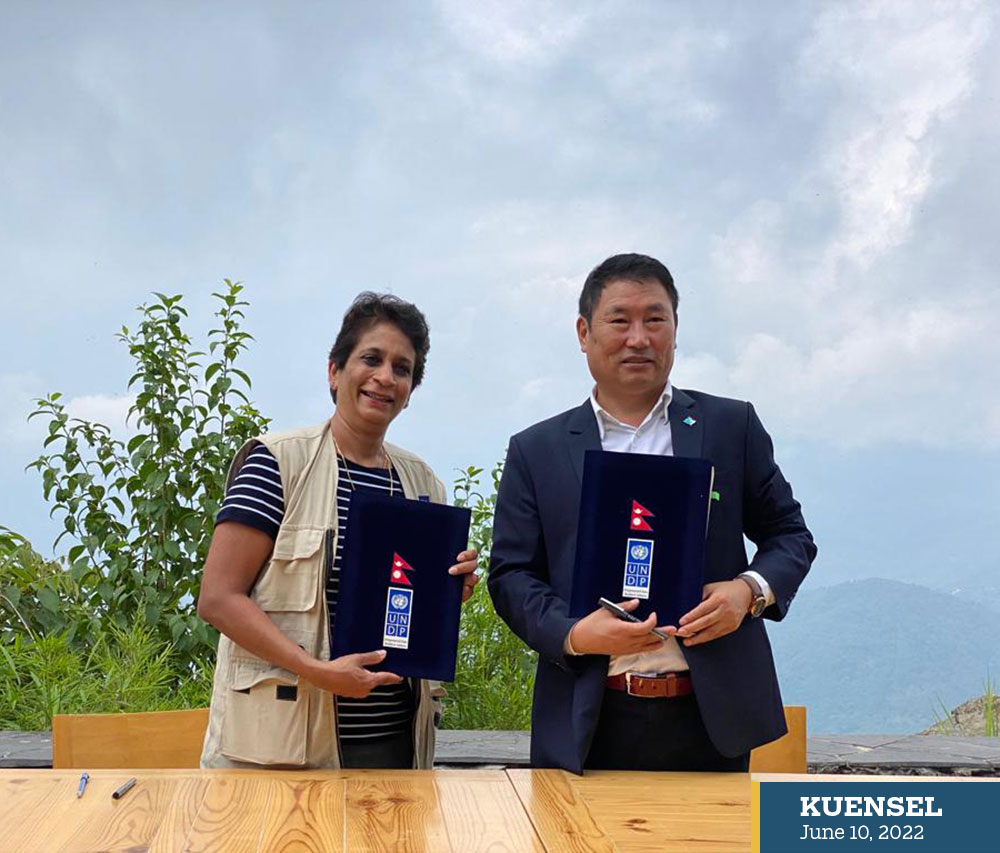Staff reporter
The United Nations Development Programme (UNDP) and International Centre for Integrated Mountain Development (ICIMOD), signed a Memorandum of Understanding (MoU) yesterday in Nepal to to promotesustainable development in the Hindu Kush Himalayan (HKH) countries.
The MoU would enhance collaboration to establish a framework for regional cooperation between the organisations to develop and share knowledge, promote capacity development, and develop policies and practices.
The partnership paves the way for increased collaboration between UNDP in eight HKH countries – Afghanistan, Bangladesh, Bhutan, China, India, Myanmar, Nepal and Pakistan – and ICIMOD on both regional and country-level climate actions.
UN Assistant Secretary General, UNDP Assistant Administrator and Regional Director for Asia and the Pacific, KanniWignaraja and ICIMOD Director General Dr Pema Gyamtsho signed a MoU.
Kanni Wignaraja said: “I am pleased to sign this agreement to deepen our long-standing partnership to build resilience in the Hindu Kush Himalayan countries. ”
She said that addressing complex challenges facing the region requires transboundary cooperation among the countries sharing the same river basins.” In the case of the Himalayas, this would need to cover the entire Ganges river basin,involving China, Nepal, Bangladesh, and India.”
Kanni Wignaraja said they would encourage the sharing of climate data and technology, climate security and risk sensitivity planning; and cross border financing and insurance for flood resistant infrastructure and coverage of loss and damage.”
Speaking after the signing of the MoU, Dr Pema Gyamtsho said: “This is a game changing partnership arrangement that will enable UNDP and ICIMOD to work together in the HKH region by drawing on their respective strengths and comparative advantages.”
He said the urgency of actions required to address climate change, biodiversity loss and air pollution warrants this level of collaboration and scaling up.
The MoU signed between UNDP and ICIMOD expresses commitment to explore and undertake joint initiatives in the areas of climate, water, biodiversity and nature conservation, transboundary climate risk reduction and adaptation to climate change, capacity building and technology transfer.
The partnership will also focus on transboundary climate risk reduction and adaptation to climate change through data sharing and a joint strategy to enhance resilience, socio-economic security, and food security.
In 2020, a joint report by UNDP and ICIMOD stated that due to rapid melting of glaciers in the Himalayas, new glacial lakes were forming, and existing ones were getting larger, increasing the risks of glacial lake outburst floods (GLOF).
At least 47 glacial lakes in the Koshi, Gandaki and Karnali river basins of Nepal, India, and the Tibet Autonomous Region of China were classed as potentially dangerous.
In Bhutan, of the 567 glacial lakes in the country, 17 have been identified as potentially dangerous lakes that could cause GLOF.
As per the UNDP’s press release, addressing these risks requires substantive transboundary and international cooperation, in terms of finances, data and technology.


